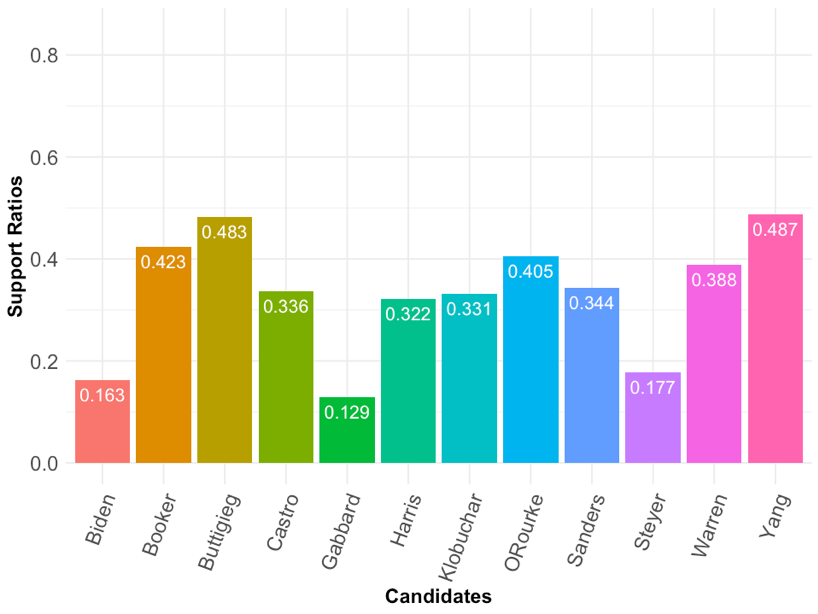GREENVILLE, NC / ACCESSWIRE / October 16, 2019 / The Center for Survey Research (CSR) at East Carolina University shows Andrew Yang and Pete Buttigieg were the winners of the Democratic national debate held October 15, 2019, according to Twitter. Sentiment analysis was used to calculate a ratio of positive to negative tweets for each of the ten candidates and was based on more than 240,000 tweets (of which 129,019 could be categorized as positive or negative for a specific candidate) made during the hours of the debate.
Click here to view the full press release, including media-ready images, downloadable resources, and more.

Key Takeaways:
- Andrew Yang and Pete Buttigieg received the most positive sentiment from Twitter during Tuesday night's debate.
- If there was an identifiable loser on Twitter, it was Tulsi Gabbard and Joe Biden.
- If the larger winds of public opinion do happen to blow in Twitter's direction, then Yang and Buttigieg will be the beneficiaries.
About the Authors
- Dr. Peter L. Francia is the Director of the Center for Survey Research and is a professor of political science at East Carolina University. He can be reached at 252-328-6126 or at franciap@ecu.edu.
- Dr. Baekkwan Park is a Senior Data Analyst at the Center for Survey Research at East Carolina University.
- Dr. Venkat N. Gudivada is chairperson and professor in the Department of Computer Science at East Carolina University.
- Jennifer Andriot is a graduate student in data science in the Department of Computer Science at East Carolina University.
Methodology Summary
The analysis in this article is based on a collection of more than 240,000 tweets containing hashtags demdebate, demdebates, democraticdebate, democraticdebates, presidentialdebate, and presidentialdebates from Twitter between 8:00 - 11:00 p.m. on October 15, 2019, through twitter streaming API. To generate our results, we filtered the data so that the analysis contained only tweet texts for each of the twelve Democratic primary candidates. The analysis relied on a supervised machine learning approach (Support Vector Machine, accuracy 83.1). This required annotated training data. We manually annotated about 4,000 tweets. Five groups of students were assigned a random set of tweets and manually labeled each tweet into two classes: positive or negative. In order to check the inter-coder reliability, we examined all the labeled data again. After retrieving and filtering all the tweets about the primary debate, we pre-processed the texts to eliminate noisy data. After classifying the tweets into two categories (positive or negative), we calculate the proportion of positive tweets over the total tweets for each candidate.
Contact:
Jonathan Morris
morrisj@ecu.edu
252-367-1067
ECU Contact
SOURCE: ECU Center for Survey Research
View source version on accesswire.com:
https://www.accesswire.com/563284/CORRECTION-Yang-and-Buttigieg-the-Big-Winners-from-Last-Nights-Debate-According-to-Twitter
